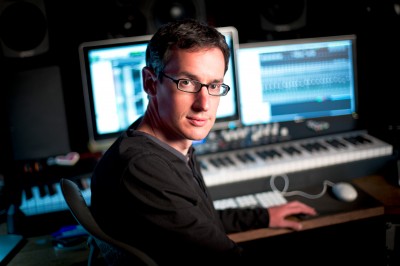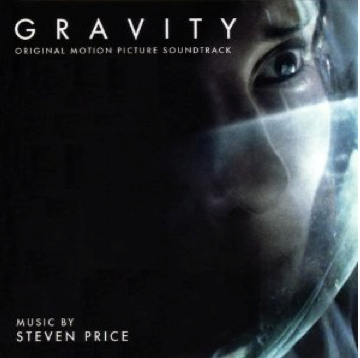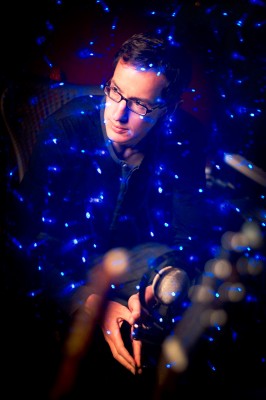With few exceptions, a lot of folks overlook the most important aspect of any film – the music score. How different would Raiders of the Lost Ark or Star Wars would have been without John Williams or Lord of the Rings without Howard Shore? As an former musician myself (I used to be good on the Piano), I have mad respect for Music Composers. Gravity is one of the most talked about films of the year and I had a chance to talk with Composer Steven Price creator of the epic score.
Congratulations on the soundtrack, it is beautiful. Can you tell us how you got this project?
SP: Thank you very much! It was a slightly strange start to the project. Initially, the production hired me as a music editor for two weeks. Whilst I’d already started my composing career shortly before with a movie called Attack the Block, I was still doing a bit of editing to pay the bills and initially thought that this would be an interesting, if short, gig. Then I met Alfonso.
In our first meeting, as he told me about the film’s themes and his ideas about the music, it was clear that he was looking for someone to come up with some musical ideas that were unique to his concept of the film’s soundtrack. I started coming up with a few ideas, and we found we enjoyed talking and working together musically. Two weeks turned into six, and then Alfonso offered me the role of composer officially. It’s been the most amazing and exciting experience.
Can you talk a bit about the process you went through to create this soundtrack?
SP: I was onboard quite early. Often the composer is one of the last people to join the production, but I was on this for the best part of a year, so there was a lot of time for experiments and trying all kinds of ideas. We’d discuss each scene, and then I’d go off to write and produce a demo that Alfonso and I could then listen to together and discuss what was and wasn’t resonating with the picture, and see where we could push further. Some of the score came relatively quickly, while with other scenes I was tinkering right up until the last minute.
With the film being based in space, where there is no sound, the music had an expanded role… it was not only underscoring the emotional journey, but also tonally representing what another film might do with sound design. So a big challenge was finding ways in which the music could play that dual role, always supporting what was happening to the lead character, Ryan.
Was there a specific thematic element that Alfonso was looking for or did he give you free reign to come up with stuff and sort of pitch him on ideas?
SP: Alfonso created an environment where we were always exploring. The way the music worked evolved throughout the whole period, and we kept things creatively open right until the end. There were some requests that had a huge bearing on the writing. Alfonso didn’t want conventional action music. With there being no sound effects, the score didn’t need to be the usual percussion and brass heavy kind of Hollywood thing, so I spent a lot of time thinking about how I could create music that was equally exciting but through different means… there’s a lot of tension created through textures evolving, and pulsating. Also, the music had to be immersive.
The film seeks to place you up in space with the characters, and the music was designed to move around you and complement the way the camera floated around in zero gravity. With all of this, Alfonso was totally open to whatever I came up with, no matter how initially weird, so long as it came from some kind of interesting place, and we had a lot of meetings where we’d go through all of the elements together and talk about where we wanted to take it next. He inspires and guides you throughout, and also supports you and encourages you to push yourself further, so it was a lot of fun.
How do you decide which instruments work best with which film?
SP: Some of it is instinctive… you just get a sense of what might work sonically with the way a film looks and the perfomances you’re accompanying. With Gravity, some of the pure, glassy tones came in quite early. They just felt right, and then it as a case of finding the right musician to express it. I was really lucky to find an amazing glass harmonica player called Alasdair Hopkins who came in and performed what I’d written and added such a beautifully human touch. Other sounds evolved out of the process.
With Gravity, I was looking to blend electronic and organic sounds, so often I’d record, say, a solo cello and then take that recording back into the studio and find a way to process and transform it so that it felt like it belonged. Lots of the sounds were developed in that way. There’s a lot of vocals in the score that were transformed into ambiences and shifting textures, so it hopefully always feels human, and emotional, but also slightly removed and taken out of place, rather as the astronauts find themselves totally isolated from the Earth.
This soundtrack certainly has elements of previous sci-fi films. What would you say are the key elements that make sci-fi soundtracks work?
SP: For me, whether it’s a sci-fi film, or something totally different such as a romantic comedy or a drama, it all comes down to the story being told. At the end of the day, film music exists to serve the story in a way that is unique to that movie, and I think the most successful scores are those that feel they totally belong, and that you can’t imagine being different in any way.
I love those scores that kind of take you a few minutes at the start of the film to adjust to… they’re expressing the essence of the film in a unique way and inviting you into that world for a couple of hours. When I think of Sci-Fi films, the ones I really remember, whether it be Blade Runner, or Star Wars, or more recently things like Solaris and Moon, they all have that quality.
What would you say are the five best/or your favorite Sci-Fi/Adventure soundtracks?
SP: Oooo now that’s a challenge! I grew up in the 80s so still carry a massive love of some of the huge sweeping scores of that era. I was a little too young for Star Wars, but something like the Back to the Future trilogy was incredibly important to me growing up, and I remember enjoying the various themes returning and lifting the whole thing in so many ways. Likewise I have a strong memory of seeing E.T. when I was a kid, and that music remains stunning and perfect to this day.
More recently I thought Clint Mansell’s work for Moon was so perfect for that film, and I enjoy the way his more minimal approach complements whatever film he’s composing for. Likewise, with someone like Cliff Martinez, whose scores for Solaris and Drive I enjoyed a lot. There are so many great scores out there, but I guess I always lean towards those that feel kind of unique, and somehow mesh conceptually in a special way.
Can you talk a bit about your background and how you got started?
SP: I was lucky in that I grew up in a family where music was always playing, and there were a couple of instruments knocking around that I could play with. I started playing guitar when I was 5, and just never stopped loving it. Through school and college I was only ever really interested in 2 things… one was music, whilst the other was stories, which I’d read and write. In lots of ways, I never grew up, in that today my life is spent making music and helping people to tell their stories! I ended up studying music at Cambridge University here in England, before getting a glamorous job as a teaboy in a recording studio. After a couple of years of that, learning as much as I could about production and recording, I was lucky enough to get some work on a film, and it was if a light bulb went off in my head.
I remember playing with the placement of a melody, the way the meaning of the notes changed depending on where I put them in relation to a moving image in a film, and just being totally and utterly convinced that this was the thing for me. That was about 13 years ago, and in that time I’ve worked in virtually every capacity there is in both film and tv music, from teaboy, to arranger and programmer, through to composing today.
9) There some truly iconic soundtracks like Star Wars, Tim Burton’s Batman, Indiana Jones, that stand up outside the confines of the movie that they were created for. How do you walk the fine line between just “freelancing” and creating something that blends well with the film?
SP: I think the focus has always got to be the needs of the story. The job is film composer, and it’s the film you’re serving… for me I’m not trying to write concert music but instead something that is totally belonging to and coming from the movie. Some films may afford you an opportunity to have a moment where the music can shine, but unless it’s justified by the needs of the characters and the story being told, it can so easily do the opposite of what it should do, and pull you out of the picture. Certain movies, like the incredible ones you mention, really allow the music to sing and those composers responded with such incredible work that will live forever. Sometimes now that sort of sweeping thematic writing is less called for by directors and producers, and the way music is used is often more reserved than in those days. But I think if the film invites that sort of contribution, it’s a joy to respond in a way that feels right.
10) Do you think a composer should know multiple instruments? What is your writing process do you use a Piano, Guitar, etc?
SP: I think there’s no rules… some of my favourite music is written by people who can play everything, and some is written by people who piece their music together through other means, embracing the technology we have nowadays. Personally, I always tend to have instruments around… I endlessly irritate those around me by noodling around on a guitar or a ukelele when the tv is on, or sitting down at the piano just when I’m supposed to be heading out somewhere. Little nuggets of ideas arrive at all sorts of times, so I’m in the habit of quickly recording whatever it is with whatever phone or tablet thing is to hand, and listening back when I’m in the studio. Then I can develop stuff, perhaps swapping to different instruments to see where that takes me, or perhaps a guitar in an odd tuning to explore something different that way. There’s a lot of trial and error, but every now and then you hope to get a little piece of music that means something to someone, and that belongs to the characters and the story you’re working with. Something that leads you on further into whatever you’re trying to do. And those are the moments you work for!
11) Can you leave us with a pearl of wisdom – or better yet a juicy spoiler for Gravity?
SP: I can’t do a spoiler! Obviously, the main reason is that I’d be shot, but also, to be honest, I think the less people know going in to Gravity the better the experience they’ll have. Regarding a pearl of wisdom… the best advice I ever got was when I was recording a piano track with a brilliant producer. I messed up a bit of the track, and ran into the control room saying he couldn’t possibly use that bit. “It’ll be your favourite part in a couple of weeks” he said. And it was. Sometimes the mistakes are the most interesting things, because they lead you somewhere else, and break you out of doing something standard. I use this bit of wisdom to justify my terrible mistakes all the time!


